
Artificial Intelligence In Cardiology Market Size, Share & Trends Analysis Report By Component (Hardware, Services), By Application (Stroke, CHD/CAD), By Region, And Segment Forecasts, 2024 - 2030
- Report ID: GVR-4-68040-047-1
- Number of Report Pages: 120
- Format: PDF
- Historical Range: 2018 - 2023
- Forecast Period: 2024 - 2030
- Industry: Healthcare
Market Size & Trends
The artificial intelligence in cardiology market size was estimated at USD 930.0 million in 2023 and is projected to grow at a CAGR of 24.6% from 2024 to 2030. The rising global prevalence of cardiovascular diseases, coupled with the increasing focus of cardiac specialists on enhancing diagnostic precision and rapid advancements in cardiac imaging technology, are among the key factors responsible for expanding the applications of AI in cardiology. For instance, in May 2023, Sensydia announced the development of its Cardiac Performance System (CPS), which uses biosensors and AI to detect heart abnormalities. The company secured USD 8 million in funding to advance its technology.
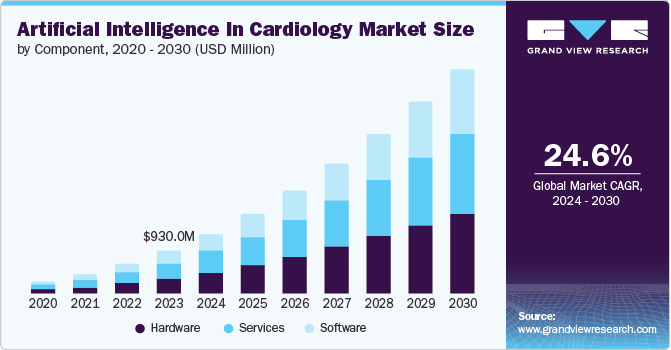
A primary factor driving the growth of AI in cardiology is the increasing prevalence of cardiovascular diseases (CVDs) and the consequent need for efficient & effective healthcare solutions. According to the WHO, CVD remains the leading cause of mortality worldwide, accounting for an estimated 17.9 million deaths annually. This escalating burden necessitates developing & implementing advanced technologies to improve disease management and patient outcomes.
The integration of AI in cardiology facilitates personalized medicine. By analyzing individual patient data, AI assists in tailoring treatment plans designed to address the unique needs and conditions of each patient. For instance, in managing heart failure, AI helps determine the most effective combination of medications and lifestyle modifications for each patient based on their specific disease profile and response to previous treatments. This personalized approach enhances the efficacy of interventions and improves patients' overall quality of life.
Moreover, AI's application in remote monitoring and telemedicine is increasing owing to the growing burden of CVD. Remote patient monitoring systems, equipped with AI, continuously track vital signs and other health parameters, providing real-time data to healthcare providers. This allows timely adjustments in treatment plans and immediate response to critical changes in a patient’s condition. Telemedicine platforms, enhanced with AI capabilities, enable continuous patient engagement and follow-up, ensuring adherence to treatment regimens and reducing the likelihood of disease progression or complications. Such factors collectively drive the adoption of AI technologies in cardiology.
Moreover, the COVID-19 pandemic has highlighted the need for AI solutions in cardiology and has accelerated its adoption in numerous healthcare settings. The impact has also increased the demand for AI solutions that can improve patient outcomes and support the effective management of patients with cardiovascular conditions. AI plays a crucial role in leveraging available heart data from COVID-19 patients to predict congestive heart failure accurately. Integrating AI into cardiovascular medicine allows healthcare professionals to identify vital signs, assess disease history, and prescribe appropriate medication more effectively. Moreover, AI-enhanced cardiovascular imaging through EHRs improves diagnostic accuracy, prognosis, and overall efficiency. This technology has revolutionized medical practice during the pandemic by making evidence-based predictions, driving its adoption in cardiology for COVID-19 patient care.
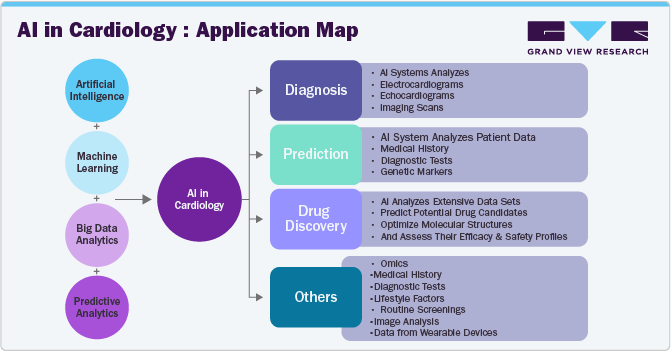
Case Study Insights
Lark Health partnered with Roche Diagnostics to develop an AI-driven lifestyle change initiative called the Lark Heart Health program. This program offers personalized cardiovascular disease risk counseling through an AI-powered mobile coaching solution that is accessible anytime and anywhere.
Key Features
-
Personalization: Offers real-time, tailored coaching on weight management, nutrition, exercise, medication adherence, stress, and other factors affecting ASCVD risk.
-
Active Participation: Engages users with evidence-based educational content presented in an easy-to-understand and relevant manner.
-
Scalability: Provides users with 24/7 access to Lark's coaching services.
-
Data Collection: Collects valuable health data that can be shared with healthcare providers, payers, and self-insured employers for better insights.
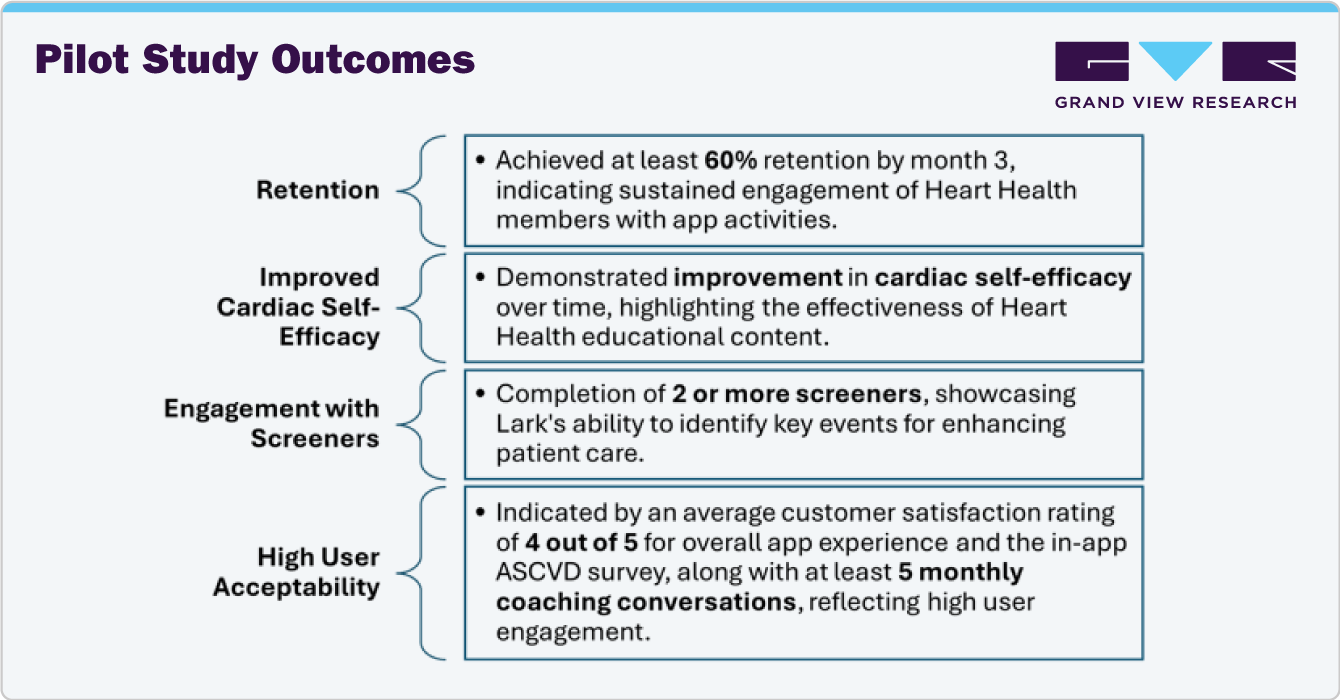
Industry Dynamics
The degree of innovation in the AI in cardiology industry is high. Technological advancements are attributed to the growing utilization of machine learning, deep learning, cloud computing, big data analytics, and other technologies. For instance, in May 2024, InfoBionic.Ai partnered with HBox.ai to develop a comprehensive cardiovascular care solution for the “Cardiology Clinic of the Future.” This collaboration combines the advanced cardiac telemetry of InfoBionic.Ai with the virtual care model of HBox.ai, providing AI-driven tools for virtual consultations, remote monitoring, and diagnostic care.
M&A activities, such as mergers, acquisitions, and partnerships, enable companies to expand geographically, financially, and technologically. For instance, in May 2023, Koninklijke Philips N.V. acquired DiA Imaging Analysis for approximately USD 100 million. This acquisition enhanced Philips' cardiac monitoring and diagnostics capabilities with advanced ECG analysis and reporting services.
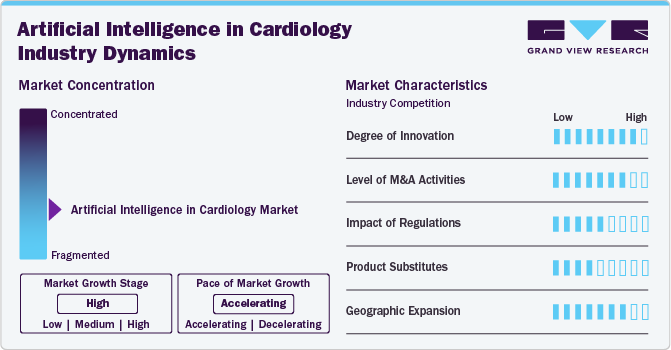
The impact of regulations is moderate to high in the industry. The industry involves several digital technologies, including AI and ML. It is regulated by different bodies in different countries. For instance, in October 2023, the WHO published key regulatory considerations for AI in healthcare. It emphasized on key factors such as transparency, documentation, risk management, AI systems development lifecycle methods, intended use, clinical & analytical validation, AI-based data quality, protection & privacy, and collaboration & engagement.
Geographic expansion significantly drives the AI in cardiology industry by increasing market penetration and revenue, enabling access to diverse data sources, and fostering regulatory compliance and standardization. For instance, in January 2024, UltraSight partnered with SELVAS Healthcare, a subsidiary of the SELVAS Group. This partnership would introduce UltraSight’s real-time AI guidance technology in Asia, starting with the regulatory approval process for potential distribution and commercialization in Korea and Southeast Asia.
Component Insights
AI-powered cardiology hardware devices dominated the market with the largest share of 36.8% in 2023 by offering enhanced diagnostic accuracy and treatment precision. These devices include advanced wearable monitors that continuously track vital signs, smart ECG machines that provide real-time analysis, and AI-enabled imaging systems that improve the detection of cardiac conditions through enhanced image processing. These innovations streamline workflows for healthcare providers and improve cardiovascular patient outcomes. For instance, in May 2024, Koninklijke Philips N.V. announced the successful deployment of ePatch across Spain. It utilizes the AI-driven Cardiologs analytics platform to detect heart arrhythmias like Atrial Fibrillation (AF).
Furthermore, the software segment is expected to grow at the fastest CAGR during the forecast period. AI-based software in cardiology is revolutionizing the field by enhancing diagnostic accuracy, improving patient monitoring, and enabling personalized treatments. Key applications include analyzing medical images, predicting cardiac events, and optimizing treatment plans. Moreover, AI software is used in clinical trials and administration work. These advancements lead to more effective healthcare delivery and better patient outcomes. For instance, in August 2023, Viz.aiannounced it received De Novo approval from the U.S. FDA for the Viz HCM module, an AI detection algorithm for HCM. This approval establishes a new regulatory classification for machine learning-based cardiovascular notification software.
Application Insights
The diagnosis segment dominated the market with the largest share of 40.1% in 2023. AI systems analyze medical data such as electrocardiograms, echocardiograms, and imaging scans to identify cardiac abnormalities and predict potential cardiovascular events accurately, leveraging advanced algorithms and machine learning techniques. These AI-powered diagnostic tools enable healthcare professionals to make quicker and more precise diagnoses, leading to earlier interventions & improved patient outcomes. For instance, in April 2024, Exo announced its AI imaging applications were cleared by the FDA for heart failure diagnosis on its handheld ultrasound system. The AI app Exo Iris aims to enhance point-of-care access to timely heart failure diagnosis, especially in under-resourced and rural settings.
The prediction segment is expected to grow at the fastest CAGR over the forecast period. The predictive models enable healthcare providers to identify high-risk individuals, implement preventive measures, and design treatment plans for individual patients, ultimately leading to improved patient outcomes and reduced healthcare costs. Hence, market players are actively advancing AI-powered prediction solutions in the cardiology domain. For instance, in May 2024, iHealthScreen created and approved risk prediction models for cardiovascular diseases by utilizing individuals' retinal color images alongside their health data.
Medical Condition Insights
The ischemic heart disease (IHD)/CAD segment dominated the market, with the largest share of 38.5% in 2023. The growth is attributed to the rising prevalence of CAD/IHD. Through advanced algorithms and machine learning techniques, AI analyzes medical images, genetic data, and patient health records to detect early signs of IHD/CAD, predict patient outcomes, and personalize treatment plans. For instance, in February 2024, the founders of Cincinnati-based Genexia developed AI technology to assess CAD risk during mammograms, offering women an additional preventative diagnostic health marker.
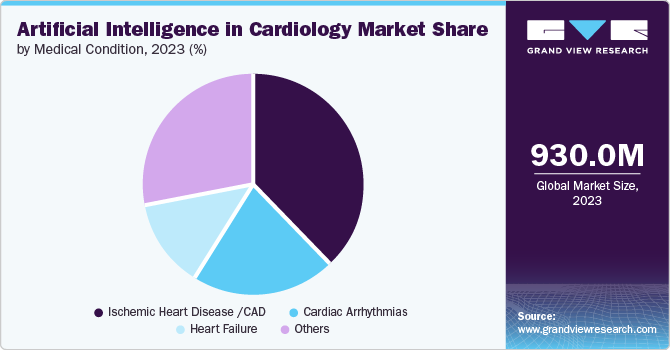
The cardiac arrhythmias segment is expected to grow at the fastest CAGR over the forecast period. Atrial Fibrillation (AF) is one of the most common clinically significant cardiac arrhythmias associated with various cardiovascular complications such as stroke and increased mortality. AI algorithms have significantly enhanced routine digital devices and diagnostic technology, enabling large-scale population screening and improved diagnostic assessments. For instance, in October 2023, Smidt Heart Institute researchers at Cedars-Sinai discovered that an AI algorithm can identify abnormal heart rhythms in asymptomatic individuals. This algorithm, capable of detecting concealed signals within standard medical diagnostic tests, could aid physicians in preventing stroke and various other cardiovascular difficulties in individuals with AF.
Regional Insights
North America dominated the artificial intelligence in cardiology market with a revenue share of over 45.5% in 2023. Advancements in AI & ML technologies, growing demand for early & accurate diagnosis, strategic initiatives by market players, and increasing prevalence of cardiovascular diseases are key factors expected to drive the regional market. For instance, in April 2024, GE HealthCare launched Caption AI, an AI software designed for quick cardiac assessments at the point of care on Vscan Air SL devices. This innovative technology provides clinicians with real-time guidance for capturing high-quality images and automated ejection fraction estimation, facilitating informed clinical decisions in various cardiac settings.
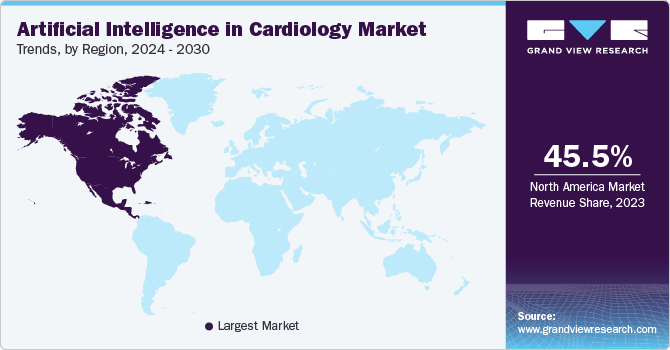
U.S. AI in Cardiology Market Trends
The AI in cardiology market in the U.S. is driven by the advancements in ML & deep learning technologies. These technologies can enable the development of refined algorithms to analyze complex medical data, such as imaging & genetic information, to provide early detection, personalized treatment plans, and improved patient outcomes. For instance, in April 2024, Eko Health received FDA approval for its Low EF detection AI. This advancement enables U.S. healthcare providers to identify Low Ejection Fraction (EF), a crucial indicator of heart failure, within 15 seconds after using an Eko stethoscope during routine physical examinations. This breakthrough in early detection represents a notable advancement in cardiovascular disease diagnosis.
Europe AI in Cardiology Market Trends
The AI in cardiology market in Europe is expected to be driven by the region’s significantregulatory support for AI innovation, substantial funding from EU authorities & national governments, and well-established healthcare infrastructure. For instance, in December 2023, the EU announced a provisional agreement on the basic content of the upcoming Artificial Intelligence Act (AI Act) to promote ethical data safeguarding and transparency regarding the usage of AI applications. The proposed legislation-anticipated to take effect between May 2024 and July 2024-was released early, providing stakeholders a view of the Act’s structure.
The UK AI in cardiology market is expected to be driven by increased efforts of market players to promote AI-powered devices and tools in treating heart disorders. For instance, in November 2023, GP clinics in Wales and London announced participation in a trial deploying an AI-powered tool to improve the diagnosis of heart failure. The TRICORDER program, funded by a USD 1.3 million (EUR 1.2 million) award from the National Institute for Health and Care Research (NIHR) and led by Imperial College London researchers, would provide AI-enabled smart stethoscopes to 100 primary care practices.
AI in cardiology market in Germany growth is boosted by the increasing number of R&D activities. In March 2024, Deutsches Herzzentrum der Charité researchers collaborated with the Mayo Clinic to study telemedical monitoring of advanced heart failure patients using voice analysis. The study employs AI technology developed by a Berlin startup.
Asia Pacific AI in Cardiology Market Trends
The AI in cardiology market in the Asia Pacific is expected to be driven by the increasing prevalence of cardiovascular diseases in multiple countries, fueling the demand for more efficient and accurate diagnostic & treatment solutions. According to the OECD, in 2019, approximately 9.85 million deaths in the region were related to cardiovascular disease. Moreover, advancements in AI & ML technologies enable the development of refined algorithms that can analyze complex medical data, such as cardiac imaging and patient records, to provide early detection & personalized treatment plans.
The Japan AI in cardiology market growth is expected to be driven by the increasing collaborations among universities, hospitals, and companies. For instance, in October 2023, Mount Sinai's Icahn School of Medicine announced signing a Memorandum of Understanding (MoU) with the Chiba Institute of Technology (CIT), establishing a collaborative partnership to leverage AI in cardiovascular disease research. This initiative is designed to enhance the efficiency of clinical trials, accelerate improvements in patient care, and expedite the introduction of potential new treatments for individuals suffering from heart conditions.
AI in cardiology market in India growth is expected to be driven by the high prevalence of cardiovascular diseases and increasing investments in healthcare technology. Collaborations between healthcare providers and technology companies promote the development & deployment of AI-driven cardiology solutions. For instance, In September 2022, Wipro GE Healthcare launched the first 'Made in India' Optima IGS 320, an AI-based Cath lab, to develop cardiac care in India. Developed at Wipro GE Healthcare's new factory under Bengaluru's Production-linked Incentive (PLI) scheme, the Cath lab uses GE's proprietary AutoRight technology. AutoRight, powered by Edison, is the neural network-based interventional image chain featuring AI that optimizes image and dose parameters in real-time, allowing clinicians to focus on patient care.
Key AI in Cardiology Company Insights
Strategic initiatives, including partnerships, new launches, collaborations & acquisitions, foster innovation and accelerate the development & deployment of AI solutions in cardiology. For instance, in November 2023, VERSICLES TECHNOLOGIES PVT LTD, a Kerala, India-based startup, launched an AI-based digital health kiosk, which claimed to offer basic diagnostics like blood sugar, blood pressure, and heart conditions in multiple languages at the lowest cost. These initiatives are often aimed at integrating AI with existing healthcare infrastructure, enhancing diagnostic accuracy, and improving patient outcomes.
Furthermore, in October 2023, Ultromics Limited obtained approval for the New Technology Add-On Payment (NTAP) from the Centers for Medicare & Medicaid Services (CMS) for its AI system, EchoGo Heart Failure. This technology is a diagnostic aid for Heart Failure with Preserved Ejection Fraction (HFpEF) during routine echocardiography assessments.
Key AI in Cardiology Companies:
The following are the leading companies in the AI in cardiology market. These companies collectively hold the largest market share and dictate industry trends.
- IDOVEN
- CardiAI
- Ultromics Limited
- Arterys Inc. (Tempus)
- Cardiologs (Koninklijke Philips N.V.)
- Ultrasight
- DiA Imaging Analysis (Koninklijke Philips N.V.)
- Vista AI
- Viz ai
- RSIP Vision
- Cleerly, Inc.
Recent Developments
-
In April 2024, Viz.ai partnered with iCardio.ai to enhance aortic stenosis detection through the integration of ultrasound imaging and artificial intelligence.
-
In April 2024, the Faithful Innovation Project consortium, led by Idoven and supported by EIT Health, initiated the development of an AI-based solution for ECGs to reduce heart failure-related hospitalizations in Europe by 40%.
-
In January 2024, Cleerly launched Cleerly ISCHEMIA, cleared by the U.S. FDA under the 510(k) medical device category. Leveraging AI technology, Cleerly ISCHEMIA assesses coronary vessel ischemia’s potential presence or absence by analyzing quantitative data on stenosis, atherosclerosis, & notable vascular morphology from patients’ CCTA images.
-
In October 2023, Ultromics Limited. obtained approval for the New Technology Add-On Payment (NTAP) from the Centers for Medicare & Medicaid Services (CMS) for its AI system, EchoGo Heart Failure. This technology is a diagnostic aid for Heart Failure with Preserved Ejection Fraction (HFpEF) during routine echocardiography assessments.
Artificial Intelligence In Cardiology Market Report Scope
|
Report Attribute |
Details |
|
Market size value in 2024 |
USD 1.3 billion |
|
Revenue forecast in 2030 |
USD 4.8 billion |
|
Growth rate |
CAGR of 24.6% from 2024 to 2030 |
|
Actual data |
2018 - 2023 |
|
Forecast period |
2024 - 2030 |
|
Quantitative units |
Revenue in USD million/billion and CAGR from 2024 to 2030 |
|
Report coverage |
Revenue forecast, company ranking, competitive landscape, growth factors, and trends |
|
Segments covered |
Component, application, medical condition, region |
|
Regional scope |
North America; Europe; Asia Pacific; Latin America; MEA |
|
Country scope |
U.S.; Canada; UK; Germany; Spain; France; Italy; Spain; Denmark; Sweden; Norway; China; Japan; India; Australia; South Korea; Thailand; Brazil; Mexico; Argentina; South Africa; Saudi Arabia; UAE; Kuwait |
|
Key companies profiled |
IDOVEN; CardiAI; Ultromics Limited; Arterys Inc. (Tempus); Cardiologs (Koninklijke Philips N.V.); Ultrasight; DiA Imaging Analysis (Koninklijke Philips N.V.); Vista AI; Viz ai; RSIP Vision; Cleerly, Inc. |
|
Customization scope |
Free report customization (equivalent up to 8 analysts working days) with purchase. Addition or alteration to country, regional & segment scope. |
|
Pricing and purchase options |
Avail customized purchase options to meet your exact research needs. Explore purchase options |
Global Artificial Intelligence In Cardiology Market Segmentation
This report forecasts revenue growth and provides at global, regional, and country levels an analysis of the latest trends in each of the sub-segments from 2018 to 2030. For this report, Grand View Research has segmented the global artificial intelligence in cardiology market report based on component, application, medical condition, and region:
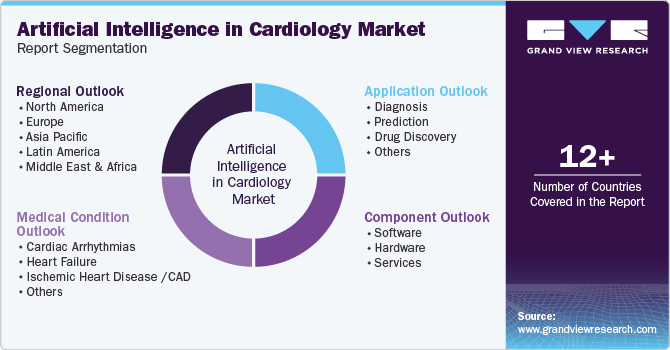
-
Component Outlook (Revenue, USD Million, 2018 - 2030)
-
Software
-
Hardware
-
Services
-
-
Application Outlook (Revenue, USD Million, 2018 - 2030)
-
Diagnosis
-
Prediction
-
Drug Discovery
-
Others
-
-
Medical Condition Outlook (Revenue, USD Million, 2018 - 2030)
-
Cardiac Arrhythmias
-
Heart Failure
-
Ischemic Heart Disease /CAD
-
Others
-
-
Regional Outlook (Revenue, USD Million, 2018 - 2030)
-
North America
-
U.S.
-
Canada
-
Europe
-
-
UK
-
Germany
-
France
-
Italy
-
Spain
-
Denmark
-
Sweden
-
Norway
-
-
Asia Pacific
-
Japan
-
China
-
India
-
Australia
-
South Korea
-
Thailand
-
-
Latin America
-
Brazil
-
Mexico
-
Argentina
-
-
Middle East & Africa
-
South Africa
-
Saudi Arabia
-
UAE
-
Kuwait
-
-
Frequently Asked Questions About This Report
b. The global artificial intelligence in cardiology market size was estimated at USD 930.0 million in 2023 and is expected to reach USD 1.3 billion in 2024.
b. The global artificial intelligence in cardiology market is expected to grow at a compound annual growth rate of 24.6% from 2024 to 2030 to reach USD 4.8 billion by 2030.
b. North America dominated the AI in cardiology market with a share of 45.5% in 2023. This is attributable to well-established healthcare infrastructure, rapid adoption of technologically advanced products, and increasing regulatory approvals of AI products in the region.
b. Some key players operating in the artificial intelligence in cardiology market include IDOVEN; CardiAI; Ultromics Limited; Arterys Inc. (Tempus); Cardiologs (Koninklijke Philips N.V.); Ultrasight; DiA Imaging Analysis (Koninklijke Philips N.V.); Vista AI; Viz ai; RSIP Vision; Cleerly, Inc.
b. Key factors that are driving the market growth include the high burden of cardiovascular diseases worldwide, the growing interest of cardiac physicians to improve accuracy in diagnosing heart diseases, and technological advancement in cardiac imagining.
We are committed towards customer satisfaction, and quality service.
"The quality of research they have done for us has been excellent."




